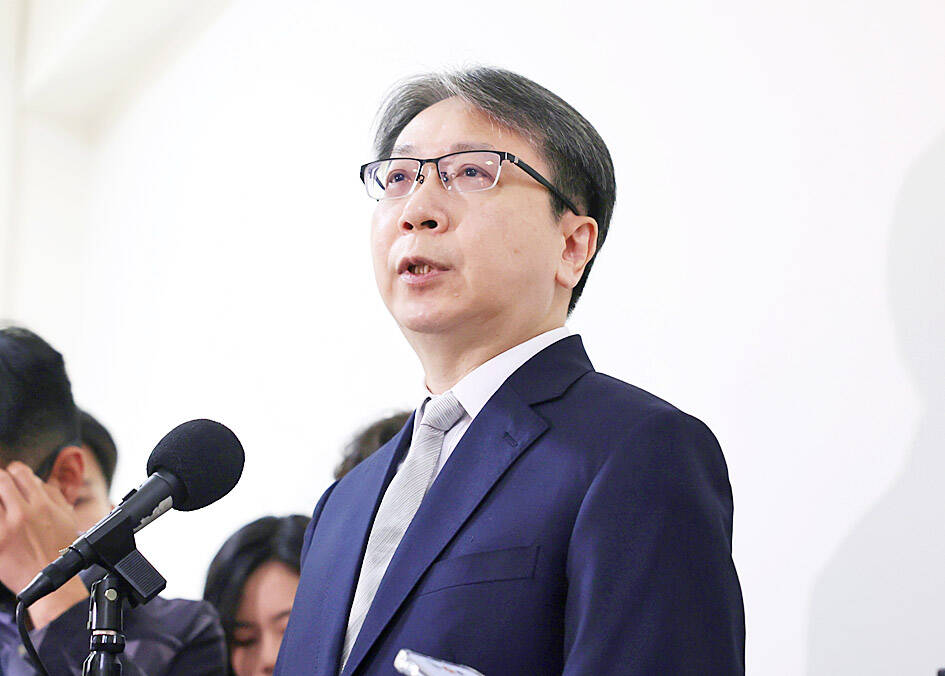Beijing is engaging with Taiwanese legislators in a bid to foster a policy of cooperation with China, National Security Bureau Director-General Tsai Ming-yen (蔡明彥) said yesterday.
Exiled Chinese writer Yuan Hongbing (袁紅冰) first suggested in February that the Chinese Communist Party (CCP) would engage with legislators from the Chinese Nationalist Party (KMT).
Tsai yesterday confirmed this to be the case, saying that the CCP was communicating with legislators, community representatives and members of non-governmental groups.

Photo: CNA
Tsai made the comments during a meeting at the legislature’s Foreign Affairs and National Defense Committee.
Democratic Progressive Party (DPP) Legislator Lo Mei-ling (羅美玲) asked Tsai whether the National Security Bureau had looked into the concerns expressed by Yuan in February.
“The bureau investigates all social and political issues in Taiwan that relate to the CCP,” Tsai said.
The bureau noticed a growing tendency of the CCP to seek strengthened exchanges with people from different segments of Taiwanese society including central and local public representatives, and members of associations, and religious, cultural and business groups, among others, he said.
“During that communication process, the CCP emphasizes common ground and downplays differences,” he said. “In particular, in communicating with legislators it pushes for policies that favor cooperation with China.”
The CCP increased exchanges with KMT and TPP legislators after the two parties gained seats in the legislature following the Jan. 13 elections, he said, adding that the bureau is keeping abreast of developments.
Responding to a question by DPP Legislator Puma Shen (沈伯洋), Tsai said the growing number of Taiwanese artists and performers working in China who express opposition to Taiwanese independence was due to CCP coercion.
The CCP requires Taiwanese working in China to sign consent forms agreeing to push a unification agenda, and threatening tax audits and other actions if they do not agree, he said.
“One thing that the CCP often does is to demand artists or management companies sign forms saying they agree with the ‘1992 consensus,’ and that there is only one China,” he said.
The so-called “1992 consensus” — a term that former Mainland Affairs Council chairman Su Chi (蘇起) in 2006 admitted making up in 2000 — refers to a tacit understanding between the KMT and the CCP that both sides of the Taiwan Strait acknowledge that there is “one China,” with each side having its own interpretation of what “China” means.
“They also must agree that during performances they would not criticize China’s political system or comment negatively on social issues in China,” he said.
The CCP also puts artificial limits on the number of attendees allowed at concerts held by Taiwanese artists in China, citing safety reasons, he said.
Shen said that the opacity of China’s interactions with Taiwanese artists made it impossible to distinguish who was being coerced and who was voluntarily adhering to the CCP’s demands.
“It would not be appropriate for the bureau to comment on individual cases or artists, but what we can say is that anyone going to China is susceptible to such coercion,” Shen said. “Therefore, we would advise caution to anyone planning to work or study in China.”

An undersea cable to Penghu County has been severed, the Ministry of Digital Affairs said today, with a Chinese-funded ship suspected of being responsible. It comes just a month after a Chinese ship was suspected of severing an undersea cable north of Keelung Harbor. The National Communications and Cyber Security Center received a report at 3:03am today from Chunghwa Telecom that the No. 3 cable from Taiwan to Penghu was severed 14.7km off the coast of Tainan, the Ministry of Digital Affairs said. The Coast Guard Administration (CGA) upon receiving a report from Chunghwa Telecom began to monitor the Togolese-flagged Hong Tai (宏泰)

Actor Lee Wei (李威) was released on bail on Monday after being named as a suspect in the death of a woman whose body was found in the meeting place of a Buddhist group in Taipei’s Daan District (大安) last year, prosecutors said. Lee, 44, was released on NT$300,000 (US$9,148) bail, while his wife, surnamed Chien (簡), was released on NT$150,000 bail after both were summoned to give statements regarding the woman’s death. The home of Lee, who has retreated from the entertainment business in the past few years, was also searched by prosecutors and police earlier on Monday. Lee was questioned three

EVA Air is prohibiting the use of portable chargers on board all flights starting from Saturday, while China Airlines is advising passengers not to use them, following the lead of South Korean airlines. Current regulations prohibit portable chargers and lithium batteries from check-in luggage and require them to be properly packed in carry-on baggage, EVA Air said. To improve onboard safety, portable chargers and spare lithium batteries would be prohibited from use on all fights starting on Saturday, it said. Passengers are advised to fully charge electronic devices before boarding and use the AC and USB charging outlets at their seat, it said. South

WAR SIMULATION: The developers of the board game ‘2045’ consulted experts and analysts, and made maps based on real-life Chinese People’s Liberation Army exercises To stop invading Chinese forces seizing Taiwan, board gamer Ruth Zhong chooses the nuclear option: Dropping an atomic bomb on Taipei to secure the nation’s freedom and her victory. The Taiwanese board game 2045 is a zero-sum contest of military strategy and individual self-interest that puts players on the front lines of a simulated Chinese attack. Their battlefield game tactics would determine the theoretical future of Taiwan, which in the real world faces the constant threat of a Chinese invasion. “The most interesting part of this game is that you have to make continuous decisions based on the evolving situation,